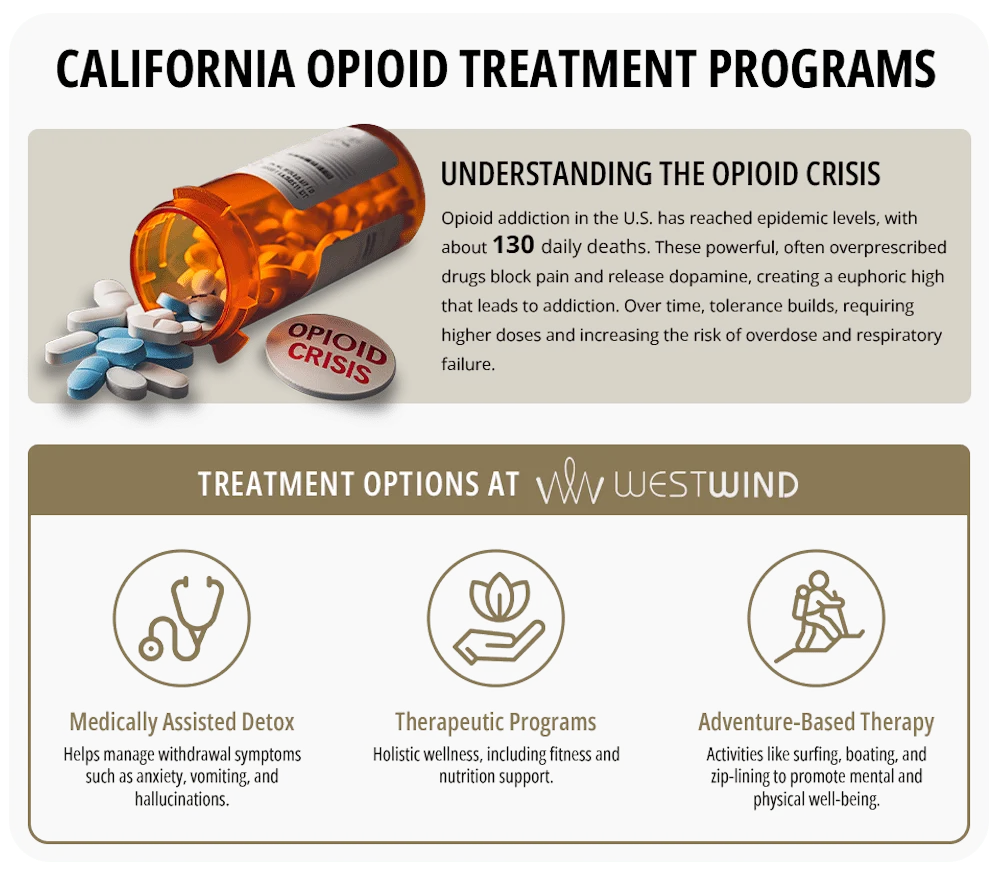Opioid addiction is a major killer across the nation. Having reached epidemic proportions, many refer to opioid use as a crisis in America. Partly, this is due to the over-prescribing of this powerful narcotic when other, less potent medications would do. If you’ve become dependent on the opioid pain medications prescribed by your doctor, or if you’ve turned to heroin or fentanyl as a last resort, help is available. A quality opioid addiction treatment program like the one offered by Westwind Recovery® in Los Angeles is the answer.
 Why Do So Many People Die From Opioid Complications?
Why Do So Many People Die From Opioid Complications?
Roughly 130 people die every day in America from complications of taking opioid drugs. Most of these are overdose deaths, and the majority are accidental. Opiates are among the most habit-forming drugs on the market. They are Schedule II drugs. This means they have a high potential for psychological and physical dependence. Still, physicians prescribe them every day for moderate pain when less dangerous drugs would be better advised.
Opioids work on receptors in your brain to release dopamine and to block pain. At the same time, they slow your body’s respiration to make you feel calm and relaxed. The result is an addictive “high” that feels so good you never want it to stop. If the problem ended here, fighting back might be an option. But the real tragedy of opioid drugs such as oxycodone and fentanyl is that your body builds up tolerance to them. You have to take higher and higher doses to feel the same, warm effects. At a high-enough dosage, opioids can stop your body’s respiration completely, and your heart ceases to beat.
This is why so many people across all walks of life die accidentally from an opioid overdose. Don’t become the latest statistic. If you’re currently using opioid drugs in any way other than your physician intended, or if you’ve been using them long-term, seeking an opioid addiction treatment program is vital. The longer you wait, the higher the risks. Reach out for help today.
The Opioid Addiction Treatment Program At Westwind Recovery®
Opioid addiction treatment at Westwind begins with gentle, medically assisted detox. This method is recommended for clients who are in treatment for opioid addiction because it eases the uncomfortable and painful symptoms associated with withdrawal. When opioids are involved, withdrawal side effects may include:
- Anxiety
- Vomiting
- Diarrhea
- Shaking
- Fever
- Hallucinations
Symptoms of opiate withdrawal are among the most severe and most uncomfortable. But at Westwind, replacement drugs such as buprenorphine, methadone, or naltrexone may be used to help calm and relieve them. This leaves you free to concentrate on recovery.
Once you’ve detoxed, and the drug has left your body, you’ll transition to the treatment phase of your opioid addiction treatment program in Los Angeles. Treatment at Westwind Recovery® offers therapeutic counseling, fellowship, and exciting outdoor adventure therapies such as surfing, boating, camping, and zip-lining. As a client in our opioid addiction treatment program, you’ll benefit from round-the-clock, personalized care as a valued member of our residential inpatient center. You’ll receive compassionate, quality attention from a full team of specialists, who may include:
- Psychologists
- Nutritionists
- Fitness instructors
- Family counselors
- Financial advocates
- Continued care specialists
We’ll make sure you’ve learned the coping skills and recovery behaviors you need to enjoy a life free from opioid drug addiction.

Contact Westwind Recovery®’s Opioid Addiction Treatment Program In Los Angeles Today
When it’s time to heal from addiction today and begin thinking about tomorrow, Westwind Recovery® is available to help. So call us right now for answers to all your questions regarding opioid treatment. Our caring and compassionate representatives are waiting to hear from you.

Dr. Deena is the Chief Clinical Officer of Westwind Recovery®, an award-winning outpatient treatment center in Los Angeles where she oversees the clinical and administrative program and treatment methods. Dr. Deena is a doctor of psychology and licensed clinical social worker since 1993. LCSW #20628. Originally from the East Coast, Dr. Deena has worked running treatment centers, worked as a therapist in psychiatric hospitals as well as school settings and currently has a thriving private practice in the LA area. Dr. Deena has appeared regularly on the Dr. Phil Show as an expert since 2003. She has also been featured on many other TV shows, podcasts and has contributed to written publications as well as podcasts.




